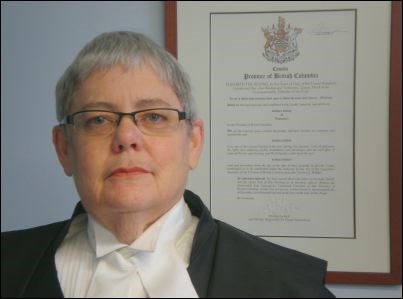Even though a Prince George transgender boy's case is still before the B.C. Supreme Court, Tuesday's judgment letting him continue with a puberty-blocking drug was the biggest part of that battle, his lawyer said.
"From my client's perspective that's winning the war, because it's crucial for him," said Barbara Findlay of the 11-year-old, identified as J.K. by the court and Findlay to protect his identity.
Justice Ronald Skolrood granted the boy - who was born a girl and has been diagnosed with gender dysphoria - the right to his own legal representation in the parental dispute over medical treatment.
While the court didn't make a final ruling on the treatment, which the father opposes and the mother supports, Skolrood wrote "J.K. is receiving treatment and that status quo will continue pending determination of (the father's) application"
That last sentence in Skolrood's judgement was everything to Findlay's client.
"The judge has gone a very long way down the road of acknowledging that the treatment that my client is getting is appropriate and that it ought not be interrupted," she said.
The judge noted the father has been "angry and resistant" to the boy's wishes and believed steps were taken without his consent and that the child "has not been properly assessed."
"The father's position was that the child should be assessed by people other than the experts in the field of gender dysphoria," said Findlay. "Which is kind of like saying if you have a heart condition you should be evaluated by a kidney specialist. It's not medically appropriate."
A previous judge ordered the father to use male or gender-neutral pronouns when referring to his child, but Skolrood noted the father repeatedly used the female pronoun and the child's former name.
"Like any child who is faced with a parent's opposition to who they are, my client is distressed that his father does not support him but relieved that the law is such that it doesn't matter, that his father can't control what happens to him," Findlay said.
The father has also objected to Findlay representing J.K., calling her a transgender activist. The judge said the both parents must agree on a "litigation guardian" who can then choose to appoint Findlay or another lawyer.
If the parents can't agree on a litigation guardian, than the mother will have "final authority," Skolrood ruled, adding she "demonstrated a better ability to act in J.K.'s best interests."
The drug - Lupron - basically puts a pause on puberty, like menstruation or breast growth in J.K.'s case.
That prospect proved especially distressing to the child and started the process to his diagnosis. Last fall, the mother told the court she took J.K. shopping for bras.
"When asked to try on the clothes, J.K. became distraught," Skolrood wrote.
Puberty is a nightmare for those with gender dysphoria, Findlay said. They experience a "real severe discomfort with the gender they've been assigned at birth. It is excruciating. It is impossible to contemplate."
That mental anguish translates to physical harm, making the drug a key method of intervention, she said.
"Being able to put a pause on developing into someone you are not - because that's what it boils down to - is a life-saving essential treatment," said Findlay, pointing to research published last year by the University of British Columbia.
The national Trans Youth Health Survey found that nearly two thirds of the 923 interviewed had engaged in self-harm in the last year and more than one in three had attempted suicide.
A further 70 per cent felt their family didn't understand them, but the children who felt their family cared about them reported better health.
"The biggest predictor of success for children and the biggest preventer of suicide is support from their parents," Findlay said.


